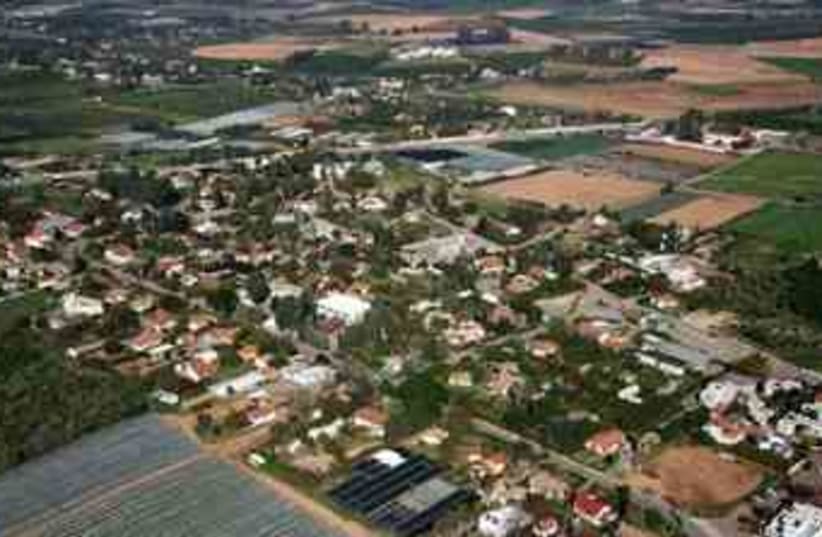As Israel forges forward with rural development, while facing the pressures of urbanization, the country could potentially benefit from purchasing more agricultural produce abroad, an expert said at a Beit Dagan conference on Thursday.“You don’t have to be self-sufficient and there is a thing called international trade,” said Prof. Allan Buckwell, senior researcher at the Institute for European Environmental Policy in London.Buckwell was addressing a conference on “The Importance and the Role of Rural Development in the Framework of Public Support to Agriculture,” in which European and Israeli experts and government officials gathered to discuss the future of rural development in Israel.
Part of an 18-month, EU-sponsored twinning project between the Israeli Agriculture Ministry and several European counterparts, the partners say they aim to shape rural development policy in a way that will boost agricultural competitiveness as well as support the income of farmers through diversification into other sectors, such as agro-tourism.Launched in February 2013, the twinning project has brought together Israeli agricultural officials and experts with their counterparts, particularly in Italy and Germany.While Thursday’s conference occurred in attempt to enhance general awareness on rural development, officials also explored how legislation in this sector might generate increased social and economic opportunities if integrated with other national policies.In order to optimally develop the rural sector, countries must shape robust policies that incorporate long-term visions of sustainable development and include, but are not limited to, strengthening agriculture, experts agreed.“The exchanges that are happening are not a one-way street,” said Ambassador of the EU to Israel Lars Faaborg-Andersen. “The starting visits to Bavaria and Sicily opened the eyes of Israelis, just as Israeli agriculture is always [an] inspiration to their German and Italian colleagues.”While maintaining a strong agricultural sector is still critical to Israel’s growth and its rural development, the country faces a growing population and rising income, making “the loss of agricultural land inevitable,” Buckwell remarked.Population pressure has led to a rising opportunity cost – the loss of potential gain from other alternatives – of agriculture, and thereby a high price food exchange on domestic products, according to Buckwell.Although Israel may enjoy – and for security reasons may even rely upon – its strong domestic food supply, increasing the amount of imported products could lead to cheaper shelf prices, he said.“Food security through trade is an issue that could sound different to Israeli ears and British ears,” Buckwell acknowledged. “We gave up two centuries ago on producing food on our little island. We buy from wherever is cheapest.”“These are choices about long-term security of supply,” he added.Buckwell stressed, however, that he is absolutely not suggesting that Israel vacate good agricultural land. But the fact of the matter remains that “citizens will vote for what is priced lower,” he explained.“I’m not suggesting that you suddenly throw open your borders,” he said. “I’m simply saying that in the long run you will double your population again and you have to understand how you are going to need to feed them, and I’m simply suggesting that more will come from abroad.”Even if less farming occurred within Israel, Buckwell said that due to the rising population, it is unlikely that the country would find itself with open space that serves no purpose.However, Israelis could benefit from more of their open space being converted for recreational and environmental protection use, he said.“People want green spaces when they live in cities,” he added.Previously extensively farmed areas could also provide environmental services, and in Europe officials are working to convince the public to pay for them, Buckwell said.There are ways of supporting systems that are less intensively agricultural but have other advantages, such as preserving biodiversity.“The bonanza of farmers in Europe is done” Buckwell said. “We are on a downward trajectory.”Officials therefore need to recognize the variety of features that rural areas have to offer in addition to agriculture, and use policies to intervene positively, he said.The EU’s Common Agriculture Practice policy now not only includes a direct pillar for agricultural market support from the EU, but also a second pillar, co-financed by participant countries, which focuses on several aspects of rural development, including agricultural competitiveness and environmental management.“Rural areas don’t just have disadvantages,” Buckwell said.“The quality of life, most people think, is higher in many ways – clean air, quieter. They also have a sense of cohesion and are closer to nature, things that people value.”Diversification of business opportunities can help improve quality of rural life, and farmers can benefit by taking advantage of the uniqueness their regions have to offer and selling their wares as local specialty products, Buckwell added.Another way to improve the lives of residents of rural areas is by attracting visitors to their regions, explained Italian Ambassador to Israel Francesco Maria Talò.“This is the concept of agro-tourism,” Talò said.“More and more people are enjoying holidays in little farms everywhere in Italy.“This is the way to not only preserve the farming industry but also the landscape and the environment.”‘In face of population growth, Israel could benefit from increasing agricultural imports’
Israeli, EU partners: Diversification of industries crucial to rural development.
